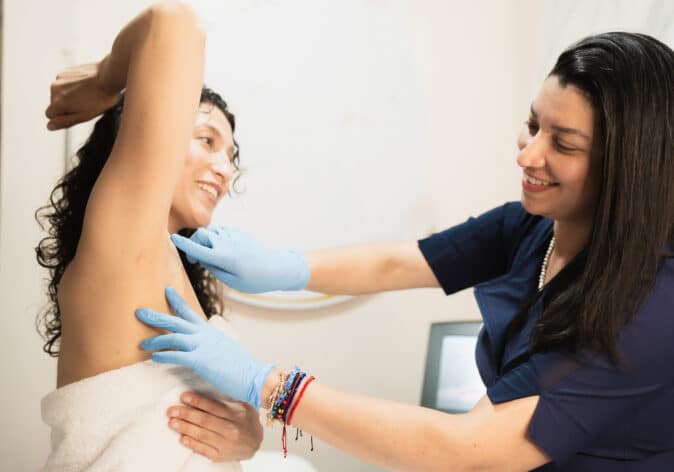2023 San Antonio Breast Cancer Symposium
The San Antonio Breast Cancer Symposium (SABCS) is one of the largest breast cancer conferences in the world, that brings together leading health professionals to hear the latest developments in research.
This is the 46th year of the conference which attracts academics, clinicians and researchers involved in breast cancer in medical, surgical, gynaecological and radiation oncology, as well as patient advocates and other health care professionals.
The 2023 conference attracted more than 10,000 attendees from more than 80 countries, including researchers from Breast Cancer Trials. We have provided a summary of important results presented at SABCS 2023 below.
Neo-N
Results from the Neo-N clinical trial have shown that over half of early-stage triple negative breast cancer patients involved in the immunotherapy study, had no evidence of cancer in the breast and lymph nodes at surgery following treatment (pathological complete response). This trial was developed by Australian researchers and conducted by Breast Cancer Trials. Professor Sherene Loi is the Study Chair of the Neo-N study. Dr Nicholas Zdenkowski presented the study at SABCS.
Neo-N investigated whether using an immunotherapy drug together with chemotherapy, is safe and effective in treating breast cancer before surgery in women and men with early triple negative breast cancer. Researchers examined if adding in immunotherapy could compensate for giving less chemotherapy. Patients received treatment before their operation, with the goal that this treatment combination could give the same outcomes but with less short and long-term side effects. 108 women participated in the study at 14 institutions in Australia, New Zealand and Italy.
The study found that patients with ‘immunotherapy sensitive’ cancer, as indicated by either tumour infiltrating lymphocytes, or PD-L1 positivity, had particularly high pathological complete responses (67% and 71% respectively). This 12-week chemo-immunotherapy treatment combination is a promising new treatment option, that has been very effective at eradicating the cancer in those patients. This was a very promising phase II clinical trial and the concept needs to be proven in a bigger phase III study, to confirm the efficacy of this type of treatment.
PROSPECT
The primary results for the PROSPECT clinical trial have been published in The Lancet and presented at a previous conference, providing evidence for a new treatment approach that may benefit both patients and the health system alike. The study examined whether a combination of MRI and pathology findings can identify women with early breast cancer who can safely avoid radiotherapy. The Australian trial was conducted by Breast Cancer Trials across four sites, including the Royal Melbourne Hospital (RMH), the Royal Women’s Hospital, the Austin Hospital in Melbourne and the Mater Hospital in Sydney. Professor Bruce Mann is the Study Chair of the PROSPECT study.
The study has found that using MRI and pathology findings can identify women who have a very low risk of breast cancer recurrence and may be suitable to avoid radiotherapy treatment. In an economic analysis, the net monetary benefit of this treatment model was found to be $2,900 per patient.
Research presented at the 2023 SABCS found that patients participating in the PROSPECT study who did not have radiotherapy, had substantially lower rates of fear of breast cancer recurrence and better quality of life compared to those who did have radiotherapy. Researchers found that patients have a positive perception about tailored care, lower treatment burden and trust in clinicians.
IBIS-II
An analysis of data from the IBIS-II clinical trial has found that hormone levels measured through blood tests, may be able to identify postmenopausal women who will benefit most from the breast cancer prevention drug anastrozole. The study was published in the Lancet Oncology and presented at the SABCS.
Researchers tested whether measuring oestrogen in the blood could identify which postmenopausal women at increased risk of developing breast cancer, will benefit most from the preventive effects of an aromatase inhibitor. They analysed data from the IBIS-II prevention trial, an international randomised controlled trial of anastrozole in high-risk postmenopausal women who had not been diagnosed with breast cancer at the time of enrolment.
In this new analysis of a case-control study of 212 women (72 cases, 140 controls), there was a clear trend of increasing breast cancer risk with increasing hormone levels in the placebo group, but not in the anastrozole group. A 55% reduction of risk of developing cancer was seen in three quarters of the women receiving anastrozole, but a lower reduction was seen in those with the lowest oestradiol/sex hormone binding globulin. This means that those with the lowest level of oestradiol had the lowest risk of breast cancer, and did not appear to benefit from the preventative effects of anastrozole. On the contrary, anastrozole appears to compensate for the higher baseline oestradiol levels by reducing the risk of breast cancer in those patients.
The IBIS-II clinical trial enrolled almost 4,000 women worldwide, with 818 women from Australia and New Zealand across 30 institutions. The trial was conducted in Australia by Breast Cancer Trials (BCT)and globally by Cancer Research UK. Dr Nicholas Zdenkowski is the BCT Study Chair of IBIS-II.
PALLAS – PAM50 Analysis
Palbociclib is a cell cycle inhibitor that has been proven to be effective in the treatment of advanced breast cancer. The primary aim of the PALLAS clinical trial was to determine if the addition of palbociclib to adjuvant hormone therapy could reduce the risk of breast cancer recurrence. The trial was open to both women and men diagnosed with Hormone Receptor (HR) positive, Human Epidermal Growth Factor Receptor 2 (HER2) negative, early-stage breast cancer.
The PALLAS clinical trial is led by the Austrian Breast & Colorectal Cancer Group (ABCSG) and is led in Australia by Breast Cancer Trials. 21 countries enrolled a total of 5,796 patients to the trial include 434 patients from Australia. Dr Nicholas Zdenkowski is the Breast Cancer Trials Study Chair of the PALLAS study.
An interim analysis of PALLAS has previously been presented in 2020 and the trial now has a 5-year median follow-up. Researchers found that there is no benefit of adjuvant palbociclib (treatment after surgery) plus endocrine therapy in early breast cancer. The benefits of treatment with palbociclib in the metastatic setting, have not translated into the early setting, and it did not prolong invasive disease-free survival, and there was also no additional benefit seen in specific subgroups of the trial population. This presentation at SABCS showed that a test of the tumour genes did not predict for efficacy of palbociclib.
MONARCH 3
The MONARCH 3 clinical trial evaluated the safety and efficacy of the drug abemaciclib in combination with an aromatase inhibitor (AI) (anastrozole or letrozole), as initial endocrine-based therapy for postmenopausal women with HR+, HER2- advanced (locoregionally recurrent or metastatic) breast cancer, who have had no prior systemic treatment for advanced disease.
Results from the study presented at the SABCS, show a numerical improvement in overall survival (OS) of 13.1 months for women with HR+, HER2- metastatic breast cancer treated with Verzenio plus an aromatase inhibitor. While the addition of Verzenio cut the risk of death by 19.6%, it didn’t reach the threshold of statistical significance, according to the final overall survival analysis. This study did not have a large enough patient sample size to confidently show an overall survival difference, as it was designed primarily to show if there was a benefit in delaying the time to worsening of the cancer. This updated analysis confirms an ongoing statistically significant benefit in progression free survival, as the primary outcome. A similar drug, ribociclib, is the only CDK4/6 inhibitor that has shown a statistically significant overall survival benefit in front-line HR+/HER2 advanced breast cancer.
INAVO120
The INAVO120 study evaluated the efficacy and safety of inavolisib in combination with palbociclib and fulvestrant versus placebo plus palbociclib and fulvestrant in people with PIK3CA-mutated, hormone receptor (HR)-positive, HER2-negative, locally advanced or metastatic breast cancer whose disease progressed during treatment or within 12 months of completing adjuvant endocrine therapy and who have not received prior systemic therapy for metastatic disease.
The study found that inavolisib in combination with palbociclib and fulvestrant significantly improved progression-free survival in the first-line setting. PIK3CA mutations, found in approximately 40% of HR-positive breast cancers, are linked to tumour growth, disease progression, and treatment resistance. The study met its primary endpoint of progression-free survival (PFS), demonstrating a statistically significant and clinically meaningful improvement compared to palbociclib and fulvestrant alone. While overall survival data were immature at this time, a clear positive trend has been observed. Follow-up will continue to the next analysis.
NATALEE
Hormone receptor-positive, HER2-negative breast cancer accounts for up to 70% of all early-stage cases of breast cancer. The current standard of care is surgery with or without chemotherapy or radiation therapy, followed by 5-10 years of endocrine therapy. About one-third of stage II and stage III early breast cancer will recur and treatment for these patients is an area of need.
The NATALEE clinical trial found that the addition of ribociclib to endocrine therapy, significantly reduced the risk of recurrence in women with hormone receptor-positive, HER2-negative, early-stage breast cancer. At the second efficacy analysis, there was a 25% relative reduction in the risk of invasive breast cancer, and the benefit was seen across all subgroups, regardless of disease stage, menopausal status, or nodal status. However, the absolute benefit was greater in those with stage 3 disease compared with stage 2. Overall survival requires longer follow-up, but a key secondary outcome of distant disease-free survival was improved by ribociclib.
KATHERINE
The KATHERINE clinical trial was considered practice changing when it was reported in 2019. This was a phase III trial evaluating ado-trastuzumab emtansine (T-DM1) vs standard-of-care trastuzumab in the adjuvant setting, in patients with HER2-positive breast cancer, who had residual disease following neoadjuvant chemotherapy and surgery. The primary end point was invasive disease-free survival (IDFS), and the secondary end points included disease-free survival and overall survival. The study met its primary end point with a 50% decrease in recurrence or death with T-DM1 compared with trastuzumab.
Updated results presented at the 2023 SABCS, with a median follow-up of 8.4 years, showed that treatment with T-DM1 demonstrated a significant and clinically meaningful improvement of the overall survival of patients with HER2+ early breast cancer who have residual invasive disease after neoadjuvant chemotherapy (treatment before surgery).
NSABP B-51
Patients who are diagnosed with breast cancer that has already spread to regional lymph nodes may receive neoadjuvant chemotherapy (treatment before surgery) and in some cases, this treatment completely eradicates the cancer from the lymph nodes. Currently, there is no established standard of care for how these patients should be treated after surgery. There is an active debate on whether these patients should be treated as patients with lymph node-positive disease (which is how they were diagnosed) or as patients with lymph-node negative disease (which is how they present at the time of surgery).
If treated as patients with lymph node-positive disease, they would be recommended to undergo chest wall irradiation plus regional nodal irradiation (RNI) after mastectomy or whole breast irradiation plus RNI after breast-conserving surgery. Alternatively, if their disease were considered lymph node-negative, they would be eligible to omit RNI after surgery. RNI is a form of radiotherapy directed to lymph nodes near the breast; it is intended to reduce patients’ risk of disease recurrence after surgery.
Some patients may prefer to avoid RNI to avoid complications associated with the treatment, such as pain, fatigue, lymphoedema, and its impact on breast reconstruction. Therefore, it is important to evaluate whether this treatment can be safely omitted in this patient population.
The NSABP B-51 clinical trial aimed to evaluate the impact of RNI on patient outcomes. The study enrolled 1,641 patients diagnosed with lymph-node positive, nonmetastatic breast cancer whose lymph nodes were found to be cancer free after neoadjuvant chemotherapy and who had undergone either mastectomy or breast-conserving surgery.
The findings suggest that downstaging cancer-positive regional lymph nodes with neoadjuvant chemotherapy can allow some patients to skip adjuvant RNI without adversely affecting oncologic outcomes. Follow-up of patients for long-term outcomes continues.
PREFERABLE EFFECT
Breast cancer and its treatment may cause side effects, such as fatigue, nausea, pain and shortness of breath, which can decrease a patient’s quality of life. For patients with metastatic breast cancer, improving their ability to function is crucial.
The results from the PREFERABLE-EFFECT clinical trial, found that patients with metastatic breast cancer who took part in a 9-month structured exercise program reported less fatigue and an improved quality life, compared to those who did not participate in the program. Those who were allocated to the standard care group received general advice about exercise.
At enrolment and after 3, 6 and 9 months, the trial participants were surveyed using the European Organisation for Research and Treatment of Cancer Quality of Life Questionnaire, which assesses patients’ physical, mental, emotional, and financial quality of life. The study found that:
• At 3, 6 and 9 months, patients assigned to the exercise intervention had average health-related quality of life scores that were significantly higher than patients in the control arm.
• Patients who participated in the exercise intervention had score that were lower (indicating decreased fatigue), at 3, 6 and 9 months, compared to patients in the controlled arm.
• At 6 months, patients assigned to the exercise intervention also reported significantly better scores with an increase in social functioning, a decrease in pain, and a decrease in shortness of breath.
Research found that at the 9-month intervention was not only effective but may have also encouraged patients to incorporate exercise into their daily routines. Many patients continued exercising beyond 9 months and it become a part of their cancer treatment regimens. Any exercise program for patients with metastatic breast cancer should be overseen by health and exercise professionals to ensure that it is safe. This trial confirms that exercise is both safe and effective for appropriately selected metastatic breast cancer patients.



